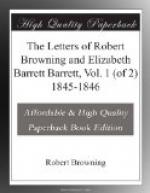How true—how true ... is all you say about critics. My convictions follow you in every word. And I delighted to read your views of the poet’s right aspect towards criticism—I read them with the most complete appreciation and sympathy. I have sometimes thought that it would be a curious and instructive process, as illustrative of the wisdom and apprehensiveness of critics, if anyone would collect the critical soliloquies of every age touching its own literature, (as far as such may be extant) and confer them with the literary product of the said ages. Professor Wilson has begun something of the kind apparently, in his initiatory paper of the last Blackwood number on critics, beginning with Dryden—but he seems to have no design in his notice—it is a mere critique on the critic. And then, he should have begun earlier than Dryden—earlier even than Sir Philip Sydney, who in the noble ‘Discourse on Poetry,’ gives such singular evidence of being stone-critic-blind to the gods who moved around him. As far as I can remember, he saw even Shakespeare but indifferently. Oh, it was in his eyes quite an unillumed age, that period of Elizabeth which we see full of suns! and few can see what is close to the eyes though they run their heads against it; the denial of contemporary genius is the rule rather than the exception. No one counts the eagles in the nest, till there is a rush of wings; and lo! they are flown. And here we speak of understanding men, such as the Sydneys and the Drydens. Of the great body of critics you observe rightly, that they are better than might be expected of their badness, only the fact of their influence is no less undeniable than the reason why they should not be influential. The brazen kettles will be taken for oracles all the world over.




